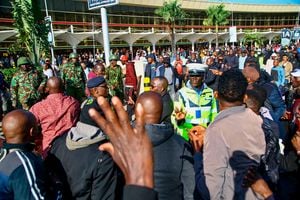EPZ workers protest over poor working condition

A section of Mahalakshmi Garments EPZ Ltd workers protests over poor working conditions on May 8, 2023.
Managers of the Export Processing Zone Authority (EPZA) are up in arms over dilapidated buildings at the company's Athi River base.
EPZ workers have complained to managers about persistent water shortages and leaking roofs at the zone.
For the past three months, the entire EPZ zone has reportedly been experiencing severe water rationing, affecting operations. The controlled zone gets its water from the Nairobi Water Company.
Investors have been forced to buy water from private sources, incurring additional costs and delaying production.
Garment companies use huge steam irons that do not use saline water. Water is considered an important facet in production lines and its unavailability causes some production lines to shut down.
Some investors, who spoke to the Nation on the condition of anonymity on Monday, said their production had been affected by 30 per cent and if the problem continued, they would be forced to close their factories.
Mahalakshmi GMT EPZ, a garment manufacturing company, is bearing the brunt of the effects of the acute water shortage.
The company's 1,200 workers are afraid of losing their jobs due to a significant reduction in production. They say that workers' hygiene is constantly being compromised and fear an outbreak of dirt-related diseases.
The foul, suffocating stench has changed the working environment and workers are crying out for authority.
"We are experiencing acute water shortage. Production is stopped, which is costing our employer. The toilets are usually blocked. We fear the worst," said Zachary Ann Mary Milimu, a worker.
The roof of the company's attic building is leaking and when it rains, work at the garment factory comes to a standstill. The company is said to have been hit hard this rainy season.
The workers said the leaking roof further exposes them to possible electrocution as electrical wires and sockets are soaked in water when it pours.
They claim the menace has caused massive stains on the exported garments, besides reducing the production rate.
"We are forced to run for safety when it's raining for fear of getting electrocuted. Most of the packaged garments for export have been damaged by water leaking from the roofs in the last month," said Zacharia Wanjala.
The agitated workers now fear that the investors in the company may close down due to the frustration of working in an unfriendly environment, leaving them jobless.
Mr Daniel Maingi, chief shop steward, urged the EPZA management to address the thorny issue, alleging that the management had ignored their plight.
"We have repeatedly brought our plight to the attention of the management, but our pleas have fallen on deaf ears. Last year, they tried to fix the leaking roof but ended up doing a shoddy job. Let's make management create a conducive working environment for investors and workers," said Mr Maingi.
But EPZA acting chief executive officer Alice Atogo shifted the blame to a department responsible for buildings.
"We are aware...that is the responsibility of the department in charge of the buildings. I cannot comment further as I am not authorised to speak to the press," she told the Nation in her office on Monday afternoon.
EPZA Athi-River Machakos County, boasts of 17 companies mainly specialising in export garments and pharmaceuticals with a human capital of at least 17,000 people working in shifts.




